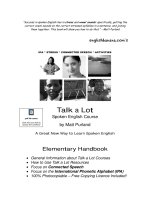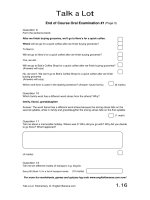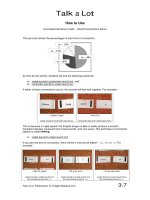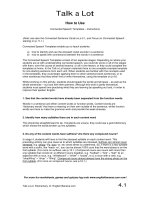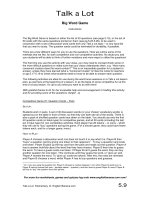35135 spoken english tips
Bạn đang xem bản rút gọn của tài liệu. Xem và tải ngay bản đầy đủ của tài liệu tại đây (102.06 KB, 11 trang )
Spoken English Tips (Learner's Experience)
The following tips helped me improve my spoken English and overcome my hesitation in the language.
Hope they are useful for you too.
1.
Don’t worry about making mistakes because you will.
2.
Be patient. This isn’t a one day process.
3.
Learn certain phrases that can be used in multiple situations.
4.
Learn how to greet someone properly.
5.
Talk slowly and carefully. Don’t rush through your sentences.
6.
Restrict yourself to simple sentences until you gain confidence.
7.
Watch out for your pronunciation. Many online tools will tell you how to pronounce a word
correctly. Check one of them out when you’re in doubt.
8.
Carefully observe how proficient speakers of the language pronounce words and frame their
sentences.
9.
Ask your friends, relatives and anyone you can to point out your mistakes and correct them.
10.
Speak to them in English only. Practice is a must.
11.
Record yourself reading one article aloud every day. Focus on pronunciation, speed, clarity
and emphasis.
12.
Many online sites offer you the opportunity to voice chat with another user. This is an effective
way to practice.
13.
Learn at least one new word every day and use it as a part of your conversation with people.
By the end of the week, you should know seven words really well.
14.
Learn new words everyday
15.
Read at least one article of your choice aloud every day.
16.
Watch English movies with subtitles.
17.
Watch English shows.
18.
Read books and magazines.
19.
Keep a pocket dictionary handy for any word you may need to know the meaning of.
20.
When you hear a new word, try to find its usage and its antonyms.
Best of luck!
How to Improve English
The importance of the English language cannot be overemphasized. Comfort with English is almost a
prerequisite for success in the world today. Regardless of the industry, proficiency in English is an
important factor in both hiring and promotion decisions.
A lot of us have studied English in school and are fairly comfortable with reading and writing. However,
we hesitate while speaking because we feel that we lack the fluency and may make grammatical
mistakes. We are afraid of speaking English in formal situations and we are quick to switch to our
native language once we are in the company of our family and friends.
There is no quick fix when it comes to improving your command over a particular language. It always
requires a lot of time and effort.
Here are EnglishLeap’s top ten tips for success in achieving proficiency and fluency in English:
1.
Do not hesitate. Talk to whoever you can. Decide among your circle of friends that you will
only talk in English with each other. This way you can get rid of hesitation and also have your
friends correct you when you are wrong.
2.
Start a conversation with strangers in English. Since you do not know them personally, you
will feel less conscious about what they would feel about you.
3.
Maintaining a diary to record the events of your day is a great way to practice your writing
skills. Take your time to use new words and phrases when you write in your diary.
4.
Read the newspaper. Read it aloud when you can. Concentrate on each word. Note down the
words you don’t understand and learn their meanings. Try to use these words in your own
sentences.
5.
Watch English movies and English shows on television. Initially, you can read the sub-titles to
follow the conversation. As you practice more, you will realize that you are able to follow the
conversation without needing to read the sub-titles.
6.
Set aside an hour every day to watch English news channels. This is one of the most
effective ways of improving your comprehension.
7.
Podcasts are available on the internet. These are audio and video files and many of these
can be downloaded for free. These are a great way to practice listening skills and develop an
understanding of different accents.
8.
It is usually quite difficult for a beginner to understand the words of an English song as there
is background music and the accent of the artist may be unfamiliar to the listener. Read the
lyrics while you listen to the song and you will comprehend better. Once you start following the
voice of a particular singer, you will find it much easier to understand the singer’s other songs too.
9.
Another effective way is to record your own voice and listen to it. You will notice hesitations
and pauses. You may also notice that you make some grammatical mistakes while speaking that
you do not make while writing. You must aim to improve and rectify these mistakes in subsequent
recordings.
10.
Ask people who speak better for advice. There is no shame in seeking help especially if you
are trying to improve yourself. Talk to them in English and ask them to correct you whenever you
are wrong.
Improve Spoken English-Learn How to improve
Spoken English (Learners Experience)
The English language is spoken in many nations including India. Speaking the language
fluently allows one to feel confident while communicating or interacting with different people.
Not being fluent in English often leads to embarrassing situations for us; we feel unsure of
ourselves and that only makes things worse. Here is what helped me overcome these
situations and become confident in English:
1.
Ever wondered why you are so fluent with your mother tongue? It is because you
speak and hear the language more often. What does this suggest? The first and the
most crucial step to improve spoken English is to speak it as often as you can. Speak in
English with friends, family, relatives etc. Do not worry about making mistakes. In fact,
encourage people around you to correct you as often as they can. This will help you
speak correct English and boost your confidence.
1.
Feeling under confident forces us to speak rapidly because we stumble with words
or feel unsure about the pronunciation. Do not let this happen, it shows anxiety and the
other person will struggle to understand what you are saying. Speak at a comfortable
pace and pronounce your words correctly. There’s is no reason to feel shy or intimidated.
We all make mistakes and the only way to learn is to practice and have others correct
us.
1.
Use a dictionary to learn new words or to find out the meaning of a word you may
have heard. Make a list and use these words as often as you can.
1.
Read books, newspapers and magazines. This will allow you to understand the
language better and help you learn new words to widen your vocabulary.
1.
Watch English movies preferably with subtitles. This too will aid you in
understanding the language better.
1.
Read one article out loud every day and if possible,and ask someone to listen and
correct you. Focus on speed, clarity and correct pronunciation.
1.
Record your own voice and listen to it. This will help you gain confidence and work
on your mistakes.
1.
Try and find a partner who is also interested in improving his/her spoken English.
Practice together, correct each other and learn together.
1.
Think in English instead of translating sentences from other languages that you’re
familiar with. Doing this leads to grammatical mistakes and deteriorates the quality of
your spoken English.
1.
Join an online English learning course. Such a programme provides you with the
right content and also provides you with opportunities to practice with other users.
Besides this, your answers are corrected and proper feedback is provided.
10 tips for speaking in English
Manek, an engineering graduate from Bhopal, said that the following practices helped him when he
was learning English:
1.
The first thing I would do after getting up every morning was read the newspaper, front to back.
It doesn’t matter which newspaper you subscribe to, as long as it is a major English-language paper,
such as The Hindu, The Times of India, Hindustan Times, The Indian Express, etc. While different
people have different opinions on the quality of each paper, they are all more or less equally useful
in getting to learn the language. It is also not necessary to read every page and article; it is timeconsuming and sometimes boring. However, you should most definitely look for articles that interest
you.
2.
I bought a pocket dictionary. They are cheap, compact and useful. There were many words I
came across on a day-to-day basis that I did not know, and carrying a pocket dictionary everywhere
allowed me to look up these words immediately so that the matter would not slip my mind later.
3.
Once learned, I also made a conscious effort to use the words in conversation. This instilled
the words in my head and I was able to draw on them whenever required.
4.
I convinced some of my friends to come together and form something of a ‘study group’; we
were all interested in learning English, and I figured it would make it easier and more fun for us to do
it together. We met twice a week in the evening and discussed the words and phrases we had come
across, suggested articles, magazines, and books to each other, etc.
5.
Another thing my group of friends and I kept in mind was the importance of talking only in
English, whenever possible. During our weekly meetings, not a word of Hindi (the only other
language any of us poke) was uttered. This sort of commitment is absolutely necessary if you want
to develop fluency.
6.
A couple of weeks into my learning experience, a friend broached the issue of language of
thought during one of our meetings. This, too, is an interesting aspect of one’s linguistic foundations:
what language do you think in? I realised that I thought in Hindi, and thus whenever I spoke in
English, I was, in a way, translating in my head. This made the entire process slower and more
laborious, so I decided to start making a conscious effort to think in English. When I spoke in Hindi, I
was often trying to figure out beforehand what the phrase would be in English before I said it. This
takes some getting used to, but soon you will find it has become second nature; the phrases come
fast and easy.
7.
I made it a point to pick up at least one English book a month. I cannot stress the importance of
this enough; books introduce you to the possibilities of the language, expose you to the various
ways in which words can be manipulated and played around with. Your vocabulary of words,
phrases, colloquialisms, etc will increase sharply this way. Also, reading develops thinking, i.e. as
you read, you will automatically begin to think more in the language that your reading material is
written in.
8.
Every night I would watch an English news channel (NDTV, Headlines Today, CNN-IBN, etc)
for at least half an hour. The news anchors and reporters generally speak very crisp and proper
English. It is also useful to watch English TV shows.
9.
My friends and I would rent the DVD of an English movie every week, and watch it with the
subtitles on. This way, you can always make out what the actors are saying, and the context of the
movie helps you understand what unfamiliar phrases might mean.
10.
I developed the habit of paying close attention whenever I was within listening distance of a
conversation in English. This may seem like eavesdropping, but when someone is speaking loud
enough in public for others to hear him or her, it is unlikely that anything very personal is being
discussed. At least, I defended my practice with that rationale, because it helped me pick up
common phrases on a daily basis.
How to speak in English (Learner's Experience)
Developing and constantly working on your English speaking skills will help you
communicate more easily and effectively, and this is particularly important in today’s
increasingly globalizing world. Here are some basic pointers on how to improve:
Practise wherever and whenever possible. Practice is always helpful, whether it is with or
without a native English speaker.
Be confident. Do not live beyond your means, i.e. stay within your comfort zone when
speaking English. Use short, simple sentences and get your point across confidently.
Utilise your vocabulary. If you have learnt a new word, use it. Try to use it in different
situations, and do not worry about whether it makes sense. Everyone makes mistakes; you
are more likely to learn the correct usage if you make a mistake that is pointed out by a
native speaker.
Don’t translate. This takes time, hinders fluency and makes you look uncomfortable.
Don't hurry! When speaking any language, a natural rhythm is important. But try not to rush
through your words; it makes it difficult for others to understand you.
To conclude:
•
•
Don’t be shy about speaking in English. Speak to as many people as you can.
Importantly, be polite. Remember the magic words (‘please’ and ‘thank you’), and use them liberally.
Spoken English Exercises : Tongue Twisters
Tongue twisters are phrases that are designed to be difficult to say, testing one’s articulation.
They are generally nonsensical, and rely generally rely on alternation between similar
sounds, like that of s and sh, or on a sequence of sounds that requires ceaseless
repositioning of the tongue.
Tongue twisters can be used a type of spoken word game. They help develop articulation
and reduce the probability of fumbling and stuttering during conversation. Adeptness with
tongue twisters will naturally lend confidence to one’s speech.
Here are some common tongue twisters that you can practice with:
She sells sea-shells on the sea-shore.
The shells she sells are sea-shells, I'm sure.
For if she sells sea-shells on the sea-shore
Then I'm sure she sells sea-shore shells.
Peter Piper picked a peck of pickled peppers.
A peck of pickled peppers Peter Piper picked.
If Peter Piper picked a peck of pickled peppers,
Where's the peck of pickled peppers Peter Piper picked?
Betty Botter bought a bit of butter.
The butter Betty Botter bought was a bit bitter
And made her batter bitter.
But a bit of better butter makes better batter.
So Betty Botter bought a bit of better butter
Making Betty Botter's bitter batter better
Telling the time
There are two ways in English of telling the time:
1.
2.
Hour first, then minutes. For e.g. 06:45 – six forty-five
Minutes first, then hour. ‘Past’ is used for minutes 01 through 30, and ‘to’ is used for minutes 31
through 59. For e.g.:
:
06:15 – fifteen minutes past six
06:45 – fifteen minutes to seven
‘Quarter past’ is a term that is often used in place of ‘fifteen minutes past.’
06:15 – quarter past six
‘Half past’ is a term that is often used in place of ‘thirty minutes past.’
06:30 – half past six
‘Quarter to’ is a term that is often used in place of ‘fifteen minutes to.’
06:45 – quarter to seven
Note:
a.
b.
c.
12 pm is also known as ‘noon’.
12am is also known as ‘midnight’.
‘o’clock’ is only ever used at the full hour.
08:00 – eight o’clock
08:30 – NOT eight thirty/half past eight o’clock
Similes
The simile is a figure of speech that describes something by comparing or establishing its
similarity to something else, using ‘like’ or ‘as’. This device makes the description more
emphatic.
Similes are written in the following forms:
1.
[subject] [verb] AS [adjective] AS...[noun]
The athlete was AS nimble AS a cat.
1.
[subject] [verb] LIKE...[noun]
This food tastes LIKE garbage.
He drives LIKE a maniac.
Here are some common examples of similes, with their meanings:
...as cool as a cucumber.
Cool-headed
...as gentle as a lamb.
Gentle, non-reactive
...as blind as a bat.
Completely blind
...as dead as a doornail.
Dead beyond a doubt
...as strong as an ox.
Very strong
...as wise as an owl.
Very wise
...to drink like a fish.
...to eat like a bird.
...to eat like a horse.
...to smoke like a chimney.
...to work like a dog.
...to sleep like a log.
To drink a lot
To eat very little
To eat a lot
To smoke a lot.
To work very hard.
To sleep soundly.
Tag Questions
The tag question is a special construct in English: a sentence consisting of a statement followed by a
fragment of a question, converting the statement itself into a question. We are all aware of this
construct; the following examples will make the concept clear:
You’re alright, aren’t you?
You don’t love me anymore, do you?
It’s rather chilly today, isn’t it?
The sentence in entirety is known as a tag question, while the ‘mini-question’ at the end is known as
the question tag. This construct is used to obtain confirmation.
Tag questions are structurally simple:
1.
Positive statements are followed by negative questions:
You enjoyed yourself at the party, didn’t you?
1.
Negative statements are followed by positive questions:
You don’t want this, do you?
Note:
Words like never, scarcely, hardly, barely, rarely and seldom have negative connotations, even when
used in statements. Therefore, the question tag must always be positive if any of these words are
used in the preceding statement. For e.g.:
You hardly see each other, do you?
You seldom know what you’re doing, do you?
Idioms involving Food
•
Apple of his/her eye : This phrase is used to refer to something or someone we like
a lot.
o
•
•
o
•
•
o
•
•
o
•
•
o
•
•
o
•
•
o
•
•
o
•
•
o
•
•
o
He was the apple of his teacher’s eye.
As cool as a cucumber : Used to refer to someone who is very cool headed and
doesn’t get worried.
Dhoni is a great captain because he always remains as cool as a cucumber.
Egg on : To encourage someone
Every time I faltered, he egged me on.
In a nutshell : In a few words.
We were told in a nutshell that our project would not be considered.
To spill the beans : To reveal a secret to someone who is not supposed to know.
The project was top secret but he spilled the beans.
Piece of cake : This phrase is used to refer to a task that is very easy.
Stealing the key was a piece of cake for him.
Take with a pinch of salt : This phrase is used when one believes only a small part
of what one is being told.
He spoke highly about his company and its success but I took it with a pinch
of salt.
Not my cup of tea : This phrase is used to indicate something you either don’t like
much or can’t do.
An early morning walk is not my cup of tea.
To sell like hotcakes : This phrase is used to refer to an object or commodity that is
very successful and selling extremely well.
The new book by J.K Rowling sold like hotcakes.
To go nuts : This phrase is used to refer to someone who is very excited about
something.
She’s going nuts because she got a scholarship.
Idioms on Colours
•
•
o
•
•
o
•
•
o
•
•
o
•
•
o
•
•
o
•
•
o
•
•
o
•
•
o
•
•
o
Black and blue : To be bruised either because of a beating or otherwise.
I am going to beat you black and blue.
Catch someone red-handed : To get caught doing something wrong, illegal or
unlawful.
He was spying on the minister and the police caught him red-handed.
Green with envy : To feel extremely jealous.
His expensive car made me go green with envy.
Off colour : A term used for someone looking weak or unwell.
He’d recovered from the attack but he still looked off colour.
Once in a blue moon : To refer to something that occurs very rarely.
I meet him only once in a blue moon.
See red : To be extremely angry about something
After she betrayed him, he was seeing red.
To show your true colours : When someone shows their true colours, they reveal the
kind of person they really are.
He behaved very well until he was asked to work overtime; it was then that
he showed his true colours.
To pass with flying colours : To pass something with flying colours is to do very well.
I had thought I wouldn’t clear the exams but I passed with flying colours.
Whitewash : To white wash something is to cover up its flaws.
The Indian government has been accused of trying to whitewash the
Commonwealth games scandal.
Golden opportunity : A golden opportunity represents an opportunity that is very
hard to come by and rather unexpected.
The deal was a golden opportunity and anyone would have been foolish to
have not signed it.
Idioms involving Body Parts
•
o
Blow your mind/Mind blowing : Something that blows your mind is extraordinary or
unbelievable.
The treasures in the palace were mind blowing
•
o
By heart : To learn something very well or to know something word-for-word.
Rohan knew the poem by heart.
•
All ears : To be all ears is to be very interested in what someone else is saying.
Raghav was all ears when he heard the teachers talking about the question
o
paper.
•
o
•
o
•
o
•
o
•
o
•
o
•
o
Close shave : The phrase close shave describes coming very close to an accident
or narrowly avoiding it.
The car almost hit me. It was a close shave.
Get on your nerves : The phrase is used for something that annoys or irritates to a
great extent.
I really don’t want to meet them, they keep asking questions and it gets on
my nerves.
Hale and hearty : This phrase is used to refer to someone who is well or in great
health.
My uncle was admitted a couple of days back for a minor stomach ache but
now he is hale and hearty.
Let your hair down : To relax and enjoy.
After a stressful day at work, Rita went to a friend’s party and let her hair
down.
No sweat : This phrase is used to refer to a task that is easy to do/ will take no
effort.
This work is no sweat.
Roll your eyes : To roll your eyes at something is to show little interest or express
disbelief.
He rolled his eyes at the presentation. Most of the information was
incorrect.
Slip of the tongue : 'Slip of the tongue' is a phrase used when someone says
something accidentally.
I’m sorry I told her about the money. It was a slip of tongue.
Homophones and Homographs
Homophones are those words that are spelt differently but pronounced the same way.
Homographs are those words that are spelt the same way but have different meanings and
may or may not be pronounced the same way.
Understanding the difference between homophones and homographs is an important part of
learning English and one that makes the experience very interesting.
Homophones are used in everyday English and many people use them wrongly. Complete
the following exercise to understand them better.
FILL IN THE BLANKS-1
I ____ at ____ (Eight/Ate)
I ate at eight.
Do you ____ if she said yes or ____?(No/Know)
Do you know if she said yes or no
I’m too ____ to step out this ____(weak/week)
I’m too weak to step out this week
And now, let’s move onto those homophones that are more confusing.
Are you going ____ watch a movie? May I come ____?(too/to)
Are you going to watch a movie ? May I come too?
They are over ____, in ____ new car. (their/there)
They are over there in their new car
I don’t think the ____ of us can carry these ____ suitcases ____the bus stop. Maybe he
should come along
____(too/to/two)
I don’t think the
two of us can carry these two suitcases to the bus stop. Maybe he should come along too.
Homographs are used in everyday English and are often used wrongly. Attempt the
following exercise to understand them better.
FILL IN THE BLANKS-2
Use words that can be utilized in both blanks but ensure that your choice is based on
spelling, not pronunciation.
1.
(a) I ________ to this.
(OBJECT)
(b) Do we need to have this ________ at home?
2.
He placed ________, coming in only half a ________ after the leader.
(SECOND)
3.
(a) The ________is blowing hard.
(b) Can you _________ up the clock?
(WIND)



